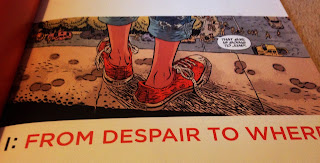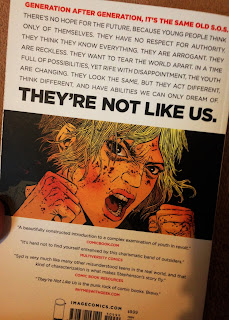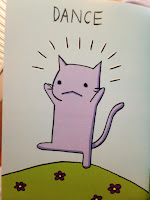It’s taken me weeks to get this done, even though it’s
technically only a few points and thoughts on Mockingjay Part 2. I wanted to communicate it as effectively as I could - be warned, spoilers lie ahead.
The film is very true to the book, apart from a few minor tweaks
which are all fine and probably necessary. I actually remembered, while writing
this, something they completely changed in the first film – Peeta’s leg never
gets amputated in the films. Is there something a little disquieting in that? I
would like to know why, creatively, they made the decision to omit that
completely as it’s really been overlooked. Is anyone else a little bit uncomfortable
about that decision?
Otherwise, I mainly want to focus on some subtle but important changes/creative decisions in the very final scenes. In the book, the
final scene in the field is very layered and powerful – in the film, it seems
like a cashed-in chance to have a semi-happy ending with neat reassurances
(that’s slightly harsh of me, but just comparatively). I felt that in the film
this scene, and this was confirmed by the chuckles of those around me, was too
romanticised (slightly cringe-worthy). Katniss is made up and pristine, babe in
her arms. Peeta is smiling and laughing, frolicking in the grass with another
child while the sun is shining over the heavenly meadow.
This is not the tone I got from the book. In the book, that ‘heavenly’
meadow is a field beneath which lie the bodies of those who died in the war. It
is noted that Katniss was reluctant to have children, remaining despondent
about the world they live in, whereas Peeta wanted to educate them about
courage and goodness. Katniss is afraid that they will have to explain about
the games – something that she can never forget. They create a memory book to
cope with the trauma and horrors that they witnessed, filling it with the good
things that people did and the people who helped them. She and Peeta rely on
each other to survive and get through – it is not so much a romantic decision
as another way to survive – they literally cannot live without the other
because they went through it together.
The
PTSD is very much ever-present and at the fore and perhaps the film could have
communicated that with a cloudier sky and sun trying to break through. These
are two people who cannot stand to continue in society – and have gone away to
heal. It is meant to be both harrowing and as hopeful as a dystopia can be when
there is no winning and only uncertainty and the hope of healing.
Just look at the language used in this epilogue – Katniss is
‘consumed by terror’ when she becomes pregnant, it is all-encompassing and her
children later ‘don’t even know they play on a graveyard’. It’s heavily
emotive, loaded word-choice.
‘One day I’ll have to explain about my nightmares. Why they
came. Why they won’t ever really go away… I’ll tell them that on bad mornings,
it feels impossible to take pleasure in anything because I’m
afraid it could be taken away. That’s when I make a list in my head of every
act of goodness I’ve seen someone do. It’s like a game. Repetitive. Even a
little tedious after more than twenty years. But there are
much worse games to play.’
It’s a brilliant, unsentimental final paragraph which still
manages to be satisfying while maintaining that classic dystopian bleak ending.
I also felt they didn’t need that scene with Gale raising
the issue of Katniss choosing between him and Peeta. In a way it shows his
immaturity, and the fact that he can never understand what they have gone
through, because to Katniss, that is a triviality. In truth, she wouldn’t be able to recover or deal with PTSD with
Gale, especially after the events with Prim. It’s a fact rather than a
sentimental romantic decision. They didn’t need to play up the love triangle.
For me, Gale and Peeta are – to some extent – devices to symbolise Just War theory. Gale is the
reckless, impulsive revolutionary who thinks the means are justified by the
ends. Book-Peeta is the voice; he is the negotiating table, the offer of bread
in the rain – he is compassion and morality. That is the triangle. And Katniss
is somewhere in between – she is survival. She wants to protect the people she
loves but still has reservations about how she does that. She is moulded and
used by those around her until she makes that final decision and act of agency,
completely by herself – to kill Coin. That is when she truly becomes an active
agent in her own right.
I’m still not completely sure it was necessary or beneficial
(besides earning a lot of money) to split the film in two. Some of the deaths
would have had a lot more impact had the narrative been allowed to flow in one
film (eg. Finnick and Prim). It lost its momentum in terms of the characters at
times. They didn’t need to make the journey through the Capitol quite so
drawn-out and games-ish. With some good editing, it could have been one
excellent film rather than two quite good ones. Talking to some people, they
didn’t really register Prim’s death – which is a moment of huge and layered
consequences. Everything that Katniss has done right from the beginning has
been for her sister – right from that first reaping. And the moment her sister
is needlessly and senselessly killed by her own side is the ultimate moment of
Absurdity – it’s the moment where Katniss must feel that everything has been
for nothing, it’s all been a waste. The girl that Gale has been watching over,
is killed by a cruel weapon of his own design. It's a brilliant and cruel twist by Collins.
‘First I get a glimpse of the blond braid down her back. Then, as she
yanks off her coat to cover a wailing child, I notice the duck tail formed by
her untucked shirt.’
Again, it’s very powerfully written, recalling that scene at
the first reaping – only this time, Katniss can’t save her:
‘I have the same
reaction I did the day Effie Trinket called her name at the reaping. At least,
I must go limp, because I find myself at the base of the flagpole, unable to
account for the last few seconds. Then I am pushing through the crowd, just as
I did before. Trying to shout her name above the roar. I’m almost there, almost
to the barricade, when I think she hears me. Because for just a moment, she
catches sight of me, her lips form my name.
And that’s when the
rest of the parachutes go off.’
In book and film, Katniss struggles to grieve – to feel –
until Buttercup reappears. Buttercup is the emotional trigger that Katniss
needs to break the depressive cycle – to purge herself, and it works
brilliantly.
The cast was excellent – truly perfect and I don’t think any
other could have pulled it off. Lionsgate have done a great job with this
series and I just hope they don’t force a prequel or any spin-offs – I will not
watch them – this story deserves to stand alone and be taken seriously. I would
have preferred a bleaker tone to the ending in line with the book but this
remains probably one of the best book to film adaptations – particularly if
we’re going by YA book-to-film (though I’m resistant to the idea that The Hunger Games should be confined to
YA – it’s leagues above most of the other dystopias in there (Divergent, Ember in the Ashes, Red Queen, and many others, in terms of
layers and depth) – and I will definitely keep revisiting it. I would give the
first film 10/10 for its tension and build up and film-work. The second one
gets a 9 and Mockingjay parts 1 & 2 get a 7.5 I think, because I feel a bit
may have been lost in the two-parter format, despite some really strong
attention to detail and a big emphasis on how Katniss is used. Performances
were still brilliant. Donald Sutherland is absolutely perfect as Snow and
Julianne Moore comes into her own as Coin in Part 2. Philip Seymour Hoffman mastered the ambiguity of his character and he is a talent that the world will always miss - an incredible actor. Jennifer Lawrence is simply the best actress of her generation - she owns every film she is in.
As an additional point – it keeps grating on me that many
are still casting Katniss as the ultimate ‘kick-ass
heroine’ or ‘strong female warrior’. (Interestingly the marketing and posters for the film are exactly the kind of thing you'd think District 13 would make, which is (hopefully, if on purpose) very clever). Katniss hunts to feed her family, she
always, always tries to survive for them. That is her only motivation
throughout most of the story. She is not a revolutionary, not directly, but she
is used by them. Every time that you say that Katniss wants to lead her
district or win a revolution or assert moral leadership – you are falling for
the rhetoric of District 13, and even the Capitol, and their terms of what
makes a hero. Seeing her as a strong female action hero in that
warrior/revolutionary sense misses the point and only perceives things within
the limits of those views. She is not a hero – at least not in the way that she
is cast by them and sometimes by us. She is much more than that – she is a
flawed, human being – a woman forced to be both parents to Prim, who will
protect the ones she loves, who can be manipulated and used but who takes a
final stand against those who control her and rejects them entirely. She is a strong
because she walks away from a world stuck on repeat – where the next society
may not be any better than the last and the only promise is that of continued
manipulation and potential future violence and revenge. Her heroic traits are
that she cares about people, and her small acts of goodness are the most
powerful – her care for Rue, for her sister, her compassion and empathy for
people on either side and her willingness to consider the morality of both
sides where others wouldn’t.
Mockingjay is my
favourite of The Hunger Games books
because it really fulfils its dystopian premise and satisfyingly concludes one
of the best books ever written about war and consumerism, image manipulation,
reality TV and the cycle of violence and revenge that pervades many aspects of
human society.












































